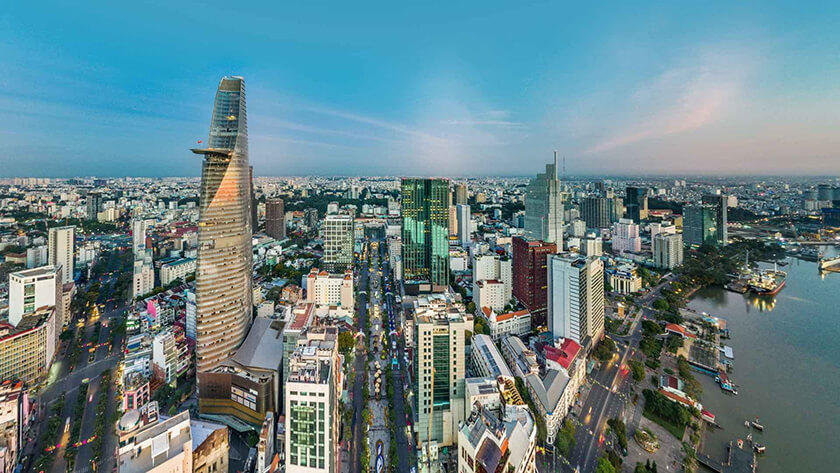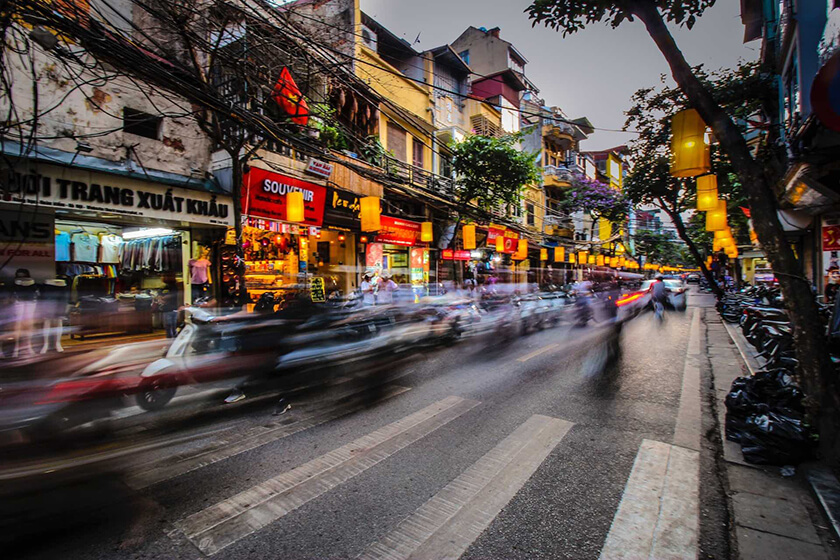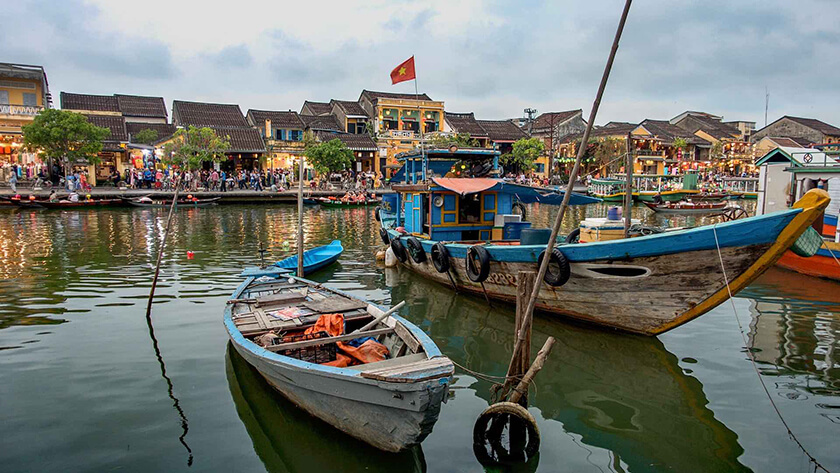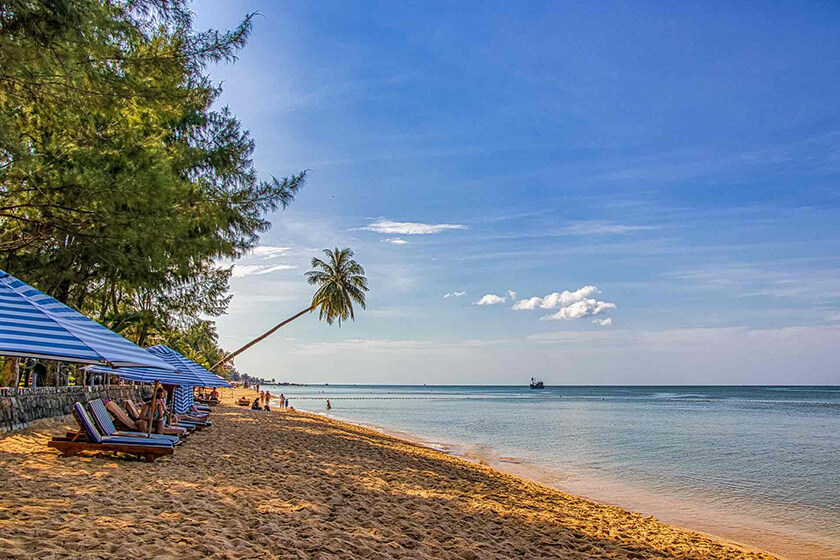Vietnam has long been a major destination for backpackers. Now, thanks to its low cost of living, year-round warm weather, fast-growing economy and a variety of travel destinations, Vietnam is becoming a popular destination for expats and digital nomads too.
If you’re a digital nomad or long-term traveller thinking of living in Vietnam, it’s important to be prepared before you make the big move.
This guide explains what you need to know if you plan to live in Vietnam as an expat, from the basics to helpful insider tips.
Living in Vietnam: Overview
- Vietnam has two major cities: Hanoi and Ho Chi Minh City (Saigon). You can also find several smaller cities that are popular with nomads, including Da Nang, Nha Trang, Da Lat and Hoi An.
- Vietnam has developed a lot over the last decade. These days, it’s easy to find modern shopping malls, apartments and other conveniences.
- Prices in Vietnam are generally lower than in neighbouring countries such as Thailand, Malaysia and Indonesia. Most people can live in Vietnam comfortably with a budget of $800 to $3,000 USD per month (59,000 to 220,000 Indian rupees).
- One advantage of living in Vietnam is that it’s easy to travel around Southeast Asia. As well as Vietnam’s domestic destinations, you can cheaply fly to Bangkok, Kuala Lumpur, Singapore and Bali via airlines like VietJet, AirAsia and FlyScoot Airlines.
- Visas to Vietnam can look intimidating, but they’re far less complicated than they first seem. As a tourist, you can extend your visa several times, allowing you to stay for a relatively long time without needing to leave the country.
- Vietnam is generally a very safe country. However, petty theft is common and there are numerous scams that you should be aware of as a tourist or digital nomad.
Best Places to Live in Vietnam
Vietnam has several cities, each of which offers its own advantages and disadvantages.
While most digital nomads living in Vietnam choose to live in Ho Chi Minh City or Hanoi, there are several small cities throughout Vietnam that offer a quieter, more laid back pace of life.
Ho Chi Minh City
Although it isn’t Vietnam’s political capital, Ho Chi Minh City is the country’s business centre and the most popular destination for digital nomads. It’s a busy place that’s bustling with activity, with lots to offer for people that like the big city lifestyle.
Ho Chi Minh City is hot year-round. As the largest city, you’ll find all of the modern conveniences you need here, from shopping malls to coworking spaces, international restaurants, high-quality apartments and more.
Hanoi
Vietnam’s second-largest city and political capital, Hanoi has a quieter atmosphere than Ho Chi Minh City and isn’t as much of a destination for digital nomads. It’s a cooler city with four distinct seasons thanks to its more northern location.
Like Ho Chi Minh City, Hanoi offers a high standard of living, with apartments, malls and other modern conveniences easy to come by. No wonder, Hanoi is a great choice for digital nomads and expats living in Vietnam.
Hoi An
Hoi An is a major tourist destination thanks to its beautiful old town. It’s also a small hub for the digital nomad community in Vietnam, with several good coworking spaces and a good selection of affordable places to stay.
Da Nang
Vietnam’s largest beach city, Da Nang is an affordable place to live and a great choice if you’d like to be close to the ocean. You can find a great variety of apartments here, as well as plenty of good places to eat, shop and relax.
Da Nang and Hoi An are approximately 45 minutes apart by car, making it common for people who live in one city to travel to the other.
Nha Trang
Another beachside city, Nha Trang is popular with tourists from Russia and China. But it’s also a great destination for expats and digital nomads living in Vietnam.
The beach is fantastic and there are several islands nearby that are even more impressive, making this a fun place for weekend trips if you live in Hanoi or Ho Chi Minh City.
Phu Quoc
Vietnam’s equivalent of Phuket, Phu Quoc is an island located in the Gulf of Thailand coast of Vietnam. While it’s a great place to visit, it’s definitely a tourist destination and doesn’t offer as much for digital nomads and long-term travellers as the country’s larger cities.
From cities to visit during your Vietnam itinerary to cities to choose to stay in Vietnam, the 6 cities mentioned above qualify all lists.
Also, Check this blog written by a fellow blogger for more tips on where to stay in Vietnam.
Vietnam Cost of Living
One of the biggest advantages for digital nomads living in Vietnam is the low cost of living. While it’s possible to spend thousands of dollars a month, you can live comfortably in Vietnam on as little as $800 per month (approximately 59,000 Indian rupees), or even less.
For example, in Ho Chi Minh City, you can rent a small apartment for $250 and spend anywhere from $250 to $500+ per month on food, transportation and entertainment, allowing you to live in Vietnam on a very affordable budget.
Major cities like Hanoi and Ho Chi Minh City also offer the opportunity to spend more than this if you’d like to live a more comfortable/luxurious life. It is possible on a budget of $3,000 per month:
- Apartment in Vinhomes Central Park: $800 USD per month (59,000 Indian rupees)
- Gym membership: $40 USD per month (2,900 Indian rupees)
- Typical day’s food costs at international restaurants: $20 USD (1,470 Indian rupees)
- Return flight from Ho Chi Minh City to Da Nang: $40 USD (2,900 Indian rupees)
Like in other countries, the cost of living in Vietnam is higher in major cities such as Hanoi and Ho Chi Minh City than it is in smaller ones. Expect to spend ~20% less than the prices above if you live in Da Nang, Nha Trang, Hoi An or another small or mid-sized city.
Check this detailed resource for more on how much money you may need as an expat or a digital nomad living in Vietnam.
Finding Accommodation
Finding accommodation in Vietnam is relatively easy, especially if you choose to stay in a major city such as Hanoi or Ho Chi Minh City. Your options include:
- Airbnb. Many Airbnb homes and apartments are available at discounted monthly rates, making this a good choice if you’re staying in one place for several months at a time but don’t want to commit to a long-term lease.
- Craigslist. Vietnam.Craigslist.org is a surprisingly good place to find cheap apartments and shared rooms. If you search carefully, you can find simple but comfortable rooms for as little as $200 USD (approximately 15,000 Indian rupees) per month.
- Facebook groups. Search for “apartments in Hanoi” or “apartments in Ho Chi Minh” on Facebook and you’ll find numerous expat and digital nomad apartment groups filled with agents offering places to stay.
Vietnam Visas
Most nationalities, including Indian passport holders, will require a visa to enter Vietnam. There are two ways to get a Vietnamese visa — by applying ahead of time in your own country, or by applying for a visa on arrival (VOA) before you travel to Vietnam.
In general, applying for a visa on arrival and picking up the visa after landing in Vietnam is the easiest option. Also, please note that entry and exit formalities are smoother at Vietnam’s international airports than at land borders.
Currently, the Vietnamese government offers tourist visas with a validity of one to three months, as well as a range of long-stay business visas. Tourist visas can be extended in-country, giving you the ability to stay for longer without leaving Vietnam during your stay.
Pricing for the visa on arrival can vary depending on the length of your stay and the amount of time for visa processing. For most nationalities, a visa on-arrival pre-approval letter is priced at $15 to $30, while a multi-entry visa letter is priced at $20 to $70.
You can learn more about current visa regulations, requirements and more at the Vietnamese government portal on immigration.
Note that you will need to pay a visa fee after arriving in Vietnam. This ranges from $25 to $50+ depending on your visa type.
Although it’s possible to apply for a visa in your home country before visiting Vietnam, this isn’t recommended. In general, the process is slow and may require you to spend several hours at the Vietnamese embassy in your country.
Tips for Digital Nomads and Expats in Vietnam
- Download essential Vietnam apps ahead of time. Apps like Grab (a local version of Uber), Now.vn, Tiki and others can make life in Vietnam a lot easier, especially when it comes to getting around and making sure you have the essentials.
- Take advantage of nomad resources. Useful travel guides make it easier to choose where to live and adjust to your life in Vietnam after you move.
- Ignore TripAdvisor and use local food apps. While international apps like TripAdvisor are great for international restaurants, you’ll find the best recommendations for authentic Vietnamese food using local apps like Foody.
- Travel within Vietnam. Vietnam has a lot to offer, making it pointless to spend your whole time in one place. Take advantage of the large variety of destinations on offer within Vietnam and cheap flights between cities.
- Buy a SIM card after you arrive. Just like in other countries, you’ll get the best prices for calls and data with a local SIM card. Options are available at all major airports from local carriers such as Viettel, Mobifone and Vinaphone.
- Pay attention to visa regulations. Visa rules in Vietnam change often, making it vital that you’re up to date, especially if you plan to extend your visa while you’re in Vietnam to enjoy a longer stay.
- Keep your valuables safe. Although Vietnam is generally safe, petty theft of items such as smartphones is common in major cities. Make sure to keep your phone, bag or other valuables close to you and avoid leaving items unattended in public places.
That’s all in this Vietnam guide for digital nomads. If you think I’ve missed something important or if you have anything you’d like to add about living and travelling in Vietnam, feel free to leave a comment below.








Thanks a lot for the post – I appreciate it. I will work as digital nomad in Vietnam and got a visa to stay longer. So I will use the time in an efficient way. A few years ago I booked a coworking space in Vietnam and enjoyed the view over with nice view over the city. It was fascinating to meet a another culture of work. But this time I have an own office. Looking forward to enjoy that live again.
Hi Dev. I’d like to stay in Vietnam at least 6 months continuously. I’m a digital nomad from the UK. Which visa is best for me?Rob